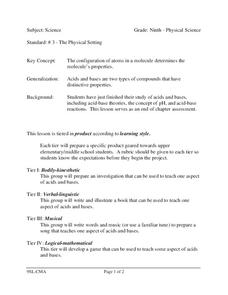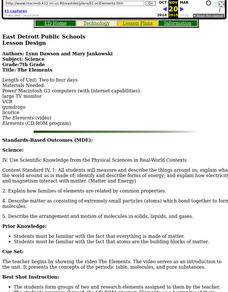Curated OER
Writing Chemical Formulas
Learners study how to write chemical fomulas by reviewing the combinations atoms form into compounds. They write a procedure to test various substances and name the compounds and write formulas. As they construct models for formulas and...
Curated OER
What is Everything Made of?
Students observe a demonstration on how we see space between water molecules. For this experimental lesson students discover what elements make up the things around them and discuss what they learned.
Curated OER
Build Your Own Atom
Students build a model of an atom using an online program. In this chemistry lesson, students discuss the different parts of the atom. They complete an independent research about their chosen element.
American Chemical Society
What is a Chemical Reaction?
When a candle burns down, what happens to the mass that appears to be shrinking? Lesson begins with a demonstration of the chemical reaction of a candle burning. Then scholars use atom models to observe conservation of mass...
American Chemical Society
Identifying an Unknown Liquid
Liquids are what's the matter with the activity! Learners investigate properties of different liquids as they interact with various types of paper. They then use their observations to identify a mystery liquid to finish the sixth...
American Chemical Society
Mixing Liquids to Identify an Unknown Liquid
Yellow and blue make green in a colorful lesson on liquid solutions. The seventh installment of a 16-part Inquiry to Action series asks pupils to mix different-colored solutions and record their observations. They then use their...
Curated OER
The Elements
Fifth graders explore the differences between elements. In this elements and atoms lesson students complete an activity that shows how chemicals react to a flame test.
Curated OER
Properties of Metals
Fifth graders study the properties of metals and use them to identify different properties. In this metal properties instructional activity students complete a demonstration .
Virginia Department of Education
Atomic Structure: Elements
It's all relevant, really. Individuals use the scientific method to learn more about elements, atoms, and their placement on the periodic table. They conduct experiments using materials common in nature to explore how elements affect our...
American Chemical Society
Matter Is Made of Tiny Particles
Believe in the invisible and convince the class that tiny particles exist even if they can't see them! A thorough lesson investigates all phases of matter and provides pupils hands-on experiences that demonstrate that all matter is made...
Curated OER
Atomic Models
Learners explain scientists' ideas about the structure of the atom over the last century. They develop a pictorial history of the changing ideas about the atom and write a caption describing the scientific thinking behind the model.
Science-Class.net
Rock Candy Crystals
Candy is one of my favorite words, and it's an even better word when it relates to science. Yes, candy science can happen when you grow rock candy crystals with your class. The entire process for growing these edible wonders of nature is...
University City High School
Metabolism Lesson Plan
Not a lesson in the traditional sense, this is a collection of resources with which you can craft a lesson on metabolic processes. It includes an outline of topics, some brief discussion, and a large array of animations, images, and...
Curated OER
What's Matter?
Learners explore many of the basic properties of matter including atoms, ions, elements, molecules, and density. The class explores an interactive flash-animated Web site to answer questions and clarify misconceptions they might have had...
American Chemical Society
What is Density?
Density: the reason a giant pumpkin will float, but a tiny cranberry won't. Lesson begins with a demonstration of two of the same-sized cubes having different densities. Then pupils take eight cubes, each of the same size, and have to...
Curated OER
Doing Lewis Dot Diagrams
Students observe the periodic table and draw the Lewis Dot Diagram. In this investigative instructional activity students construct information on several elements including the Lewis Dot Formation and take a quiz on the...
Curated OER
Making Molecules
In this making molecules worksheet, students complete a table of elements with their symbol, atomic number, atomic mass, number of protons, number of electrons, period and group. Students then make models using pipe cleaners and beads of...
Curated OER
Student Reading - The Unique Properties of Water
Without water there would be no life on this planet. Biology learners find out why by reading this handout. Create a worksheet of questions to answer after the reading. Follow it up with quick demonstrations or laboratory activities that...
Curated OER
The Physical Setting
Ninth graders study the configuration of atoms in molecules to see that it determines the molecule's properties. In this chemistry lesson plan students divide into groups and complete their assigned task.
Curated OER
The Elements
Students watch video, The Elements, research information about elements using both the Internet and CD-ROM program, and create atoms out of gumdrops and licorice.
Curated OER
Matter, Matter
Learners define vocabulary related to the parts of the atom. In this matter instructional activity, students navigate the web to find the structure and the forces that affect atoms. Learners complete an experiment with...
Curated OER
Reaction Reasoning
Third graders experiment with chemical reactions and examine what happens to the atoms when different reactions occur. In this matter lesson students divide into groups and complete a lab experiment.
Curated OER
Physical Science Project-Atom
Fifth graders investigate atoms. In this atom lesson, 5th graders investigate the parts of an atom. Students explore atom numbers and determine the number of electrons is in each atom.
Curated OER
Chromatography
Eighth graders observe a compound and separate it into its component parts. In this chromatography lesson students complete and activity that demonstrates how mixtures can be separated into components.























